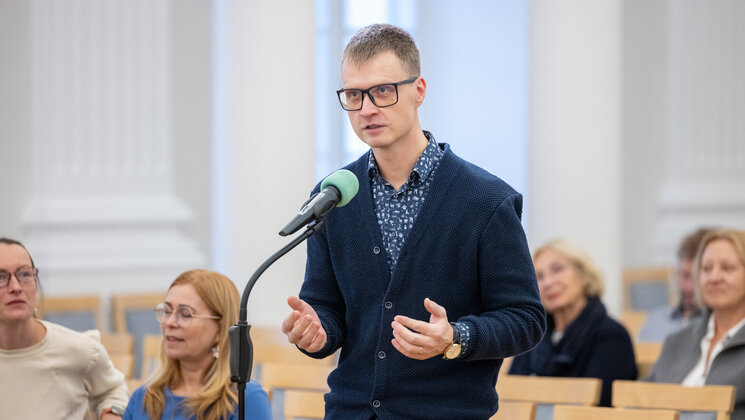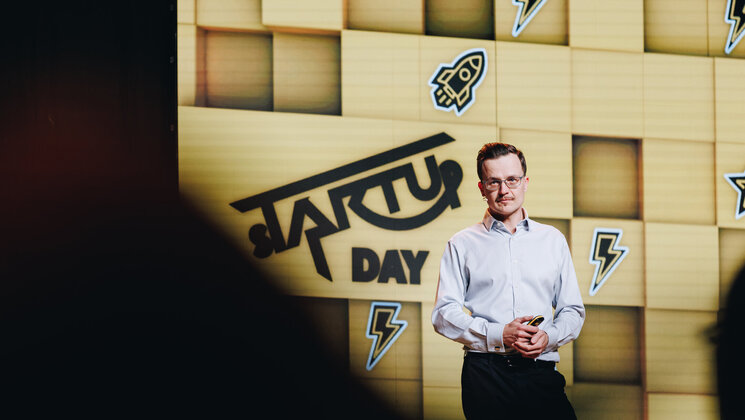-
Faculty of Arts and HumanitiesDean's Office, Faculty of Arts and HumanitiesJakobi 2, r 116-121 51005 Tartu linn, Tartu linn, Tartumaa EST0Institute of History and ArchaeologyJakobi 2 51005 Tartu linn, Tartu linn, Tartumaa EST0Institute of Estonian and General LinguisticsJakobi 2, IV korrus 51005 Tartu linn, Tartu linn, Tartumaa EST0Institute of Philosophy and SemioticsJakobi 2, III korrus, ruumid 302-337 51005 Tartu linn, Tartu linn, Tartumaa EST0Institute of Cultural ResearchÜlikooli 16 51003 Tartu linn, Tartu linn, Tartumaa EST0Institute of Foreign Languages and CulturesLossi 3 51003 Tartu linn, Tartu linn, Tartumaa EST0School of Theology and Religious StudiesÜlikooli 18 50090 Tartu linn, Tartu linn, Tartumaa EST0Viljandi Culture AcademyPosti 1 71004 Viljandi linn, Viljandimaa EST0Professors emeriti, Faculty of Arts and Humanities0Associate Professors emeriti, Faculty of Arts and Humanities0Faculty of Social SciencesDean's Office, Faculty of Social SciencesLossi 36 51003 Tartu linn, Tartu linn, Tartumaa EST0Institute of EducationJakobi 5 51005 Tartu linn, Tartu linn, Tartumaa EST0Johan Skytte Institute of Political StudiesLossi 36, ruum 301 51003 Tartu linn, Tartu linn, Tartumaa EST0School of Economics and Business AdministrationNarva mnt 18 51009 Tartu linn, Tartu linn, Tartumaa EST0Institute of PsychologyNäituse 2 50409 Tartu linn, Tartu linn, Tartumaa EST0School of LawNäituse 20 - 324 50409 Tartu linn, Tartu linn, Tartumaa EST0Institute of Social StudiesLossi 36 51003 Tartu linn, Tartu linn, Tartumaa EST0Narva CollegeRaekoja plats 2 20307 Narva linn, Ida-Virumaa EST0Pärnu CollegeRingi 35 80012 Pärnu linn, Pärnu linn, Pärnumaa EST0Professors emeriti, Faculty of Social Sciences0Associate Professors emeriti, Faculty of Social Sciences0Faculty of MedicineDean's Office, Faculty of MedicineRavila 19 50411 Tartu linn, Tartu linn, Tartumaa ESTInstitute of Biomedicine and Translational MedicineBiomeedikum, Ravila 19 50411 Tartu linn, Tartu linn, Tartumaa ESTInstitute of PharmacyNooruse 1 50411 Tartu linn, Tartu linn, Tartumaa ESTInstitute of DentistryL. Puusepa 1a 50406 Tartu linn, Tartu linn, Tartumaa ESTInstitute of Clinical MedicineL. Puusepa 8 50406 Tartu linn, Tartu linn, Tartumaa ESTInstitute of Family Medicine and Public HealthRavila 19 50411 Tartu linn, Tartu linn, Tartumaa ESTInstitute of Sport Sciences and PhysiotherapyUjula 4 51008 Tartu linn, Tartu linn, Tartumaa ESTProfessors emeriti, Faculty of Medicine0Associate Professors emeriti, Faculty of Medicine0Faculty of Science and TechnologyDean's Office, Faculty of Science and TechnologyVanemuise 46 - 208 51003 Tartu linn, Tartu linn, Tartumaa ESTInstitute of Computer ScienceNarva mnt 18 51009 Tartu linn, Tartu linn, Tartumaa ESTInstitute of GenomicsRiia 23b/2 51010 Tartu linn, Tartu linn, Tartumaa ESTEstonian Marine Institute0Institute of PhysicsInstitute of ChemistryRavila 14a 50411 Tartu linn, Tartu linn, Tartumaa EST0Institute of Mathematics and StatisticsNarva mnt 18 51009 Tartu linn, Tartu linn, Tartumaa EST0Institute of Molecular and Cell BiologyRiia 23, 23b - 134 51010 Tartu linn, Tartu linn, Tartumaa ESTTartu ObservatoryObservatooriumi 1 61602 Tõravere alevik, Nõo vald, Tartumaa EST0Institute of TechnologyNooruse 1 50411 Tartu linn, Tartu linn, Tartumaa ESTInstitute of Ecology and Earth SciencesJ. Liivi tn 2 50409 Tartu linn, Tartu linn, Tartumaa ESTProfessors emeriti, Faculty of Science and Technology0Associate Professors emeriti, Faculty of Science and Technology0Institute of BioengineeringArea of Academic SecretaryHuman Resources OfficeUppsala 6, Lossi 36 51003 Tartu linn, Tartu linn, Tartumaa EST0Area of Head of FinanceFinance Office0Area of Director of AdministrationInformation Technology Office0Administrative OfficeÜlikooli 17 (III korrus) 51005 Tartu linn, Tartu linn, Tartumaa EST0Estates Office0Marketing and Communication OfficeÜlikooli 18, ruumid 102, 104, 209, 210 50090 Tartu linn, Tartu linn, Tartumaa EST0Area of RectorRector's Strategy OfficeInternal Audit OfficeArea of Vice Rector for Academic AffairsOffice of Academic AffairsUniversity of Tartu Youth AcademyUppsala 10 51003 Tartu linn, Tartu linn, Tartumaa EST0Student Union OfficeÜlikooli 18b 51005 Tartu linn, Tartu linn, Tartumaa EST0Centre for Learning and TeachingArea of Vice Rector for ResearchUniversity of Tartu LibraryW. Struve 1 50091 Tartu linn, Tartu linn, Tartumaa EST0Grant OfficeArea of Vice Rector for DevelopmentCentre for Entrepreneurship and InnovationNarva mnt 18 51009 Tartu linn, Tartu linn, Tartumaa EST0University of Tartu Natural History Museum and Botanical GardenVanemuise 46 51003 Tartu linn, Tartu linn, Tartumaa EST0International Cooperation and Protocol Office0University of Tartu MuseumLossi 25 51003 Tartu linn, Tartu linn, Tartumaa EST0
Media Literacy Research Group Developed a Digital Competence Enhancement Web Repository

The Media Literacy Research Group at the Institute of Social Sciences has translated and adapted the applied materials created during the international project ySKILLS ("Youth Digital Skills"). The website is accessible to everyone and is primarily intended for young people, teachers, support specialists, and parents.
Members of the research group, Veronika Kalmus, Signe Opermann and Mari-Liis Tikerperi, presented the ySKILLS web repository at a conference titled "Smartly on the Web: Digital Well-being and Mental Health" held in Tallinn on International Safer Internet Day. The website, located at sisu.ut.ee/yskills, features practical educational and informational materials that encourage young people to think critically, engage in discussions, and test their digital skills. Translated and adapted slide presentations, interactive exercises, discussion questions, and animated films can be used in various subject classes, theme days, and workshops focusing on digital skills. The ySKILLS educational resources can also be integrated into cross-curricular activities, such as addressing mental health or environmental topics.
Digital skills and mental well-being

"In addition to measuring digital skills and knowledge, our research also focused on young people's mental well-being and its relationship to digital skills,"
The results indicated that while good skills and knowledge help young people utilize the opportunities of the digital world extensively, they may not be sufficient to address complex situations that endanger mental well-being. Young people also need support and assistance from peers and adults.
Advice for supporting young people's mental well-being can be found in the ySKILLS informational materials, which were developed based on the results of qualitative research and involved consultations with young people who have experienced mental health issues.
The web repository also includes information on research methodology, ethics, and children's rights in the digital world, consolidates research outputs produced with the participation of the Estonian research group, and introduces the main findings of the ySKILLS longitudinal study.
Reliable Comparative Studies
Commenting on the results of school surveys, Veronika Kalmus, the head of the research group and professor of sociology, emphasized the significance of global digital media in young people's lives.

"We conducted surveys for three consecutive years with students aged 12 to 17 in six countries. We observed that in global media and digital culture contexts, the digital skills and knowledge of today's teenagers have become quite homogeneous. European school students excelled the most in communication skills, while performing poorest in information seeking and processing,"
"Estonian students showed the most improvement in content creation over two years – the proportion of students with very good skills increased from 40% to 45%," she added.
In the opening speech of the Safer Internet Day conference, Kristi Vinter-Nemvalts, the Secretary General of the Ministry of Education and Research, also relied on the results of ySKILLS, quoting the findings of the EU Kids Online study on children's internet usage. "In addition to the PISA test, EU Kids Online, in which our research group has represented Estonia since 2007, and ySKILLS are essentially the only major international studies that allow for the assessment of Estonian youth's skills and experiences compared to their peers in other countries, and enable evidence-based policy decisions," Veronika Kalmus concluded.
One of the upcoming activities of the Media Literacy Research Group is preparing for a new data collection for EU Kids Online and applying for funding.
Text composed by:
Veronika Kalmus, Professor of Sociology
Signe Opermann, Research Fellow in Sociology of Media
Read more similar news





